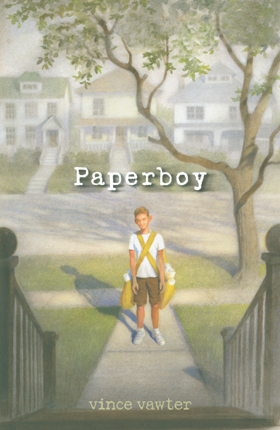Full Text Reviews: Bulletin for the Center... - 03/01/2013 It is with some trepidation that the eleven-year-old narrator, who withholds his name until he completes his story, takes over his best friend’s paper route until the other boy returns from vacation. It’s not that pitching papers is too hard; he’s known among the local kids for his arm on the diamond. Afflicted with a severe stutter, he’s embarrassed and concerned about how he will communicate with customers when he makes the collection rounds—a weekly task back in 1959. The humble neighborhood route turns into something of a voyage of discovery for the boy, who normally keeps to himself. There’s the flirtatious attention of a young alcoholic housewife, a glimpse into the mysterious condition of a boy who sits at the TV with the sound turned off, a bachelor who lives among stacks of books and has a knack for helping the new paperboy control his stutter, and, in a darker turn, a junk collector who attacks and threatens the life of the black housekeeper who looks after the paperboy. The protagonist tells his tale in short paragraphs that capture the way he imagines his own fluent speech—articulate, economical, and completely devoid of commas, since there are already too many pauses in his actual speech. Confidence born of his weeks of accomplishment eases his stutter somewhat, and readers will offer quiet but heartfelt congratulations when he finally utters his own name, which begins with the letter most difficult for him to pronounce. EB - Copyright 2013 The Board of Trustees of the University of Illinois. Booklist - 04/15/2013 *Starred Review* It’s hot in Memphis during the summer of 1959—in all kinds of ways. Things heat up for the book’s 11-year-old narrator when he takes over his pal Rat’s paper route; meeting new people is a horror for the boy because he stutters. He only really feels comfortable with Rat and Mam, the African American maid who takes care of him when his parents are away, which is often. But being the paperboy forces him to engage in the world and to ask for payments from customers, like pretty, hard-drinking Mrs. Worthington and Mr. Spiro, who gives the boy the confidence to voice his questions and then offers answers that—wondrously—elicit more questions. Others intrude on his life as well. In a shocking scene, Ara T, the dangerous, disturbing junk man tries to take something precious from the boy. In some ways, the story is a set piece, albeit a very good one: the well-crafted characters, hot Southern summer, and coming-of-age events are reminiscent of To Kill a Mockingbird. But this has added dimension in the way it brilliantly gets readers inside the head of a boy who stutters. First-time author Vawter has lived this story, so he is able to write movingly about what it’s like to have words exploding in your head with no reasonable exit. This paperboy is a fighter, and his hope fortifies and satisfies in equal measure. - Copyright 2013 Booklist. School Library Journal - 04/20/2013 Gr 6–9—After an overthrown baseball busts his best friend's lip, 11-year-old Victor Vollmer takes over the boy's paper route. This is a particularly daunting task for the able-armed Victor, as he has a prominent stutter that embarrasses him and causes him to generally withdraw from the world. Through the paper route he meets a number of people, gains a much-needed sense of self and community, and has a life-threatening showdown with a local cart man. The story follows the boy's 1959 Memphis summer with a slow but satisfying pace that builds to a storm of violence. The first-person narrative is told in small, powerful block paragraphs without commas, which the stuttering narrator loathes. Vawter portrays a protagonist so true to a disability that one cannot help but empathize with the difficult world of a stutterer. Yet, Victor's story has much broader appeal as the boy begins to mature and redefine his relationship with his parents, think about his aspirations for the future, and explore his budding spirituality. The deliberate pacing and unique narration make Paperboy a memorable coming-of-age novel.—Devin Burritt, Wells Public Library, ME - Copyright 2013 Publishers Weekly, Library Journal and/or School Library Journal used with permission. Loading...
|



